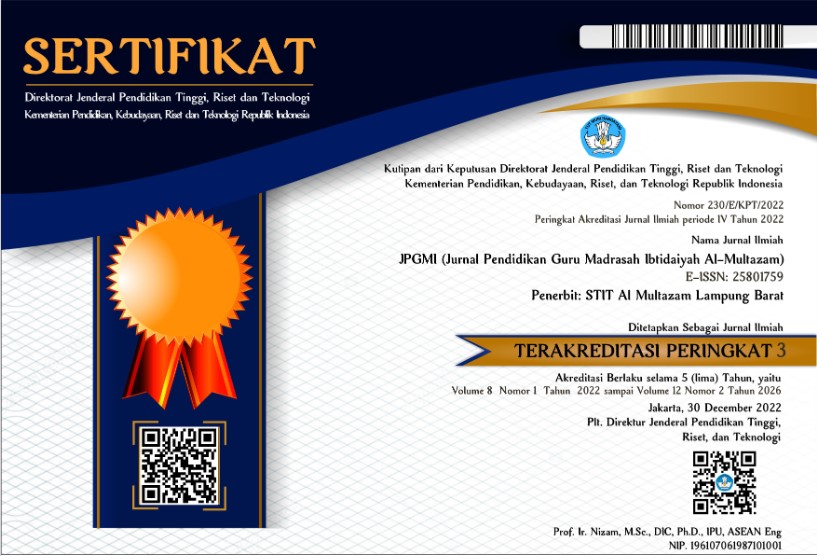PERENCANAAN PENDIDIKAN BERBASIS FITRAH DI SEKOLAH ALAM SE-PROVINSI LAMPUNG
(1) Program Pasca Sarjana, Prodi Manajeman Pendidikan Islam UIN Raden Intan, Lampung
(2) Program Pasca Sarjana, Prodi Manajeman Pendidikan Islam UIN Raden Intan, Lampung
(3) Program Pasca Sarjana, Prodi Manajeman Pendidikan Islam UIN Raden Intan, Lampung
(4) Program Pasca Sarjana, Prodi Manajeman Pendidikan Islam UIN Raden Intan, Lampung
 Corresponding Author
Corresponding Author
Abstract
Nature-based education planning in natural schools in Lampung Province has given rise to a new approach in integrating natural values, natural elements and local wisdom in the curriculum. This research is motivated by the complexity of educational needs and the call of the times that demand changes in the concept of education. This research uses a qualitative approach with case studies as the main method. The case study method provides an in-depth description of the implementation of the planning strategy, while qualitative analysis is used to gain an in-depth understanding of its impact. The research results show that developing a nature-based curriculum involves an in-depth process in designing a special curriculum that reflects natural values, integrates natural elements, and involves education experts and community leaders. Training for educators through regular workshops and mentoring by fitrah experts has a positive impact on increasing understanding of the concept of fitrah and the quality of learning. The integration of local values creates a learning environment rich in Lampung cultural wisdom. Facilities and learning environments that support direct interaction with nature create learning spaces that allow students to be actively involved. Parental and community participation is realized through routine programs and partnership forums, strengthening their involvement in shaping children's character. Holistic periodic evaluation involving all stakeholders creates the basis for comprehensive monitoring of student development. Collaboration with local governments and educational institutions opens up opportunities for financial support and exchange of experiences, strengthening the concept of natural schools based on nature. Despite facing limited resources and potential resistance, this research shows that nature-based educational planning in natural schools in Lampung Province has great potential to create a responsive and holistic educational environment.
Keywords
References
Abdullah, A. Pendidikan Karakter Berbasis Fitrah. (Jakarta: Erlangga, 2019).
Amin, M. Paradigma Pendidikan Islam di Sekolah Alam. (Surabaya: Bintang Pustaka, 2017).
Amin, R. (2021). "Pembelajaran Bermakna melalui Integrasi Nilai-nilai Lokal." Jurnal Pendidikan Inovatif, 10(2), 45-60
Arief, A. (2016). "Konsep Pendidikan Sekolah Alam dan Implementasinya dalam Pendidikan Anak Usia Dini." Jurnal Pendidikan Anak, 5(2), 123-138.
Chavis, D. M., & Wandersman, A. (2017). Sense of Community in the Urban Environment: A Catalyst for Participation and Community Development. American Journal of Community Psychology.
Csikszentmihalyi, M. (1997). Creativity: Flow and the Psychology of Discovery and Invention. HarperCollins.
Dewey, J. (2017). Democracy and Education: An Introduction to the Philosophy of Education. Macmillan.
Epstein, J. L. (2018). School/Family/Community Partnerships: Caring for the Children We Share. Phi Delta Kappa.
Fauzan, A. (2018). "Pendidikan Berbasis Alam: Solusi Terhadap Tantangan Pendidikan di Era Digital." Jurnal Pendidikan Dasar, 9(1), 67-79.
Fitriani, L. (2018). "Responsif terhadap Kebutuhan Lokal dalam Kurikulum Pendidikan." Jurnal Pendidikan Multikultural, 7(3), 180-195.
Haryanto, M. (2019). "Kontribusi Ahli Pendidikan dalam Pengembangan Kurikulum Berbasis Fitrah." Jurnal Pendidikan Inovatif, 8(3), 45-60.
Hasbi, M. Sekolah Alam: Model Pendidikan Berbasis Fitrah. (Bandung: Remaja Rosdakarya, 2019).
Hidayat, R. Pendidikan Berbasis Fitrah di Sekolah Alam: Konsep dan Implementasinya. (Yogyakarta: Pustaka Pelajar, 2021
Indra, S. (2020). "Peran Tokoh Masyarakat dalam Pengembangan Kurikulum Lokal." Jurnal Kajian Pendidikan Lokal, 9(2), 78-93.
Lewin, K. Principles of Topological Psychology. McGraw-Hill. 2019,
Piaget, J. The Psychology of Intelligence. Routledge. 2017.
Rogers, C. R. (2016). Freedom to Learn for the 80's. Charles E. Merrill Publishing Company.
Scriven, M. (2018). The Methodology of Evaluation. American Psychologist, 22(10), 828-838.
Simon, H. A. (2019). Models of Man: Social and Rational. John Wiley & Sons.
Siregar, A. (2021). "Evaluasi Berkelanjutan dalam Konteks Pengembangan Kurikulum Lokal." Jurnal Pendidikan Karakter, 10(1), 112-128
Sukardi, A. Pendidikan Karakter: Konsep dan Implementasi di Sekolah. (Jakarta: Kencana, 2018).
Suparlan, P. (2021). "Implementasi Pendidikan Berbasis Alam dalam Pembelajaran di Sekolah Dasar." Jurnal Pendidikan Dasar, 12(2), 89-104.
Super, D. E. (2018). The Psychology of Careers: An Introduction to Vocational Development. Harper & Brothers.
Susanto, A. (2019). "Peningkatan Kualitas Pembelajaran melalui Pelatihan Berbasis Fitrah." Jurnal Pendidikan Guru Sekolah Dasar, 8(2), 78-92.
Thomas, W. P., & Collier, V. P. (1997). School Effectiveness for Language Minority Students. National Clearinghouse for Bilingual Education.
Vygotsky, L. S. (2018). Mind in Society: The Development of Higher Psychological Processes. Harvard University Press.
Yusuf, M. Filsafat Pendidikan Islam: Konsep, Teori, dan Aplikasinya. (Jakarta: Rajawali Press, 2020).
Article Metrics
Abstract View : 0 times
: 0 times Download : 5 times
Download : 5 times
DOI: 10.54892/jpgmi.v10i1.246
Refbacks
- There are currently no refbacks.


